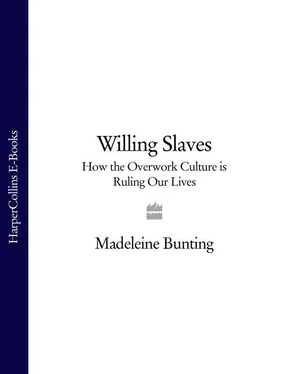The nature of work is changing, and its demands are increasing. These two trends have coincided over the last two decades with the move of women into paid employment. Family life no longer revolves around one breadwinner and one carer, but typically around one full-time and one part-time earner; in a generation we have seen a dramatic shift of time and energy from the unpaid caring economy into the paid labour market. The disinvestment of women in the caring economy has not been accompanied by sufficient compensating investment by men. The result is a care deficit – a shortage of time and energy to invest in relationships. It begins with a deficit of care towards ourselves, in which our work culture makes us ill, and at its worst can kill. There is also a deficit in the care of children, and across the myriad of interdependent relationships which sustain us in families, friendships and neighbourhoods. The result is an emotional impoverishment of all our lives: the office is now where the heart is, not the home, as the complexities of the workplace demand an ever larger share of our emotional resources. Women’s participation in the labour market did not need to exact such a steep price.
The emails I received echoed some of my experience as one of the generation of Thatcher’s teenagers, whose understanding of public affairs developed in the shadow of the severe recession of the early eighties, soaring unemployment and the miners’ strike. The harsh rhetoric of public debate in those years dismantled the post-war consensus – the role of the welfare state was challenged, old institutions such as trade unions emasculated. Dependency became a term of abuse, independence the ultimate aspiration; individualism was to be forged by work and upward mobility; these ideas seduced many, particularly women, determined not to be caught as their mothers had been in the confines of the home and child-rearing. ‘The only way is up,’ as the hit single went. The fact that many were left behind only underscored the ‘survive or die’ mentality. So we worked hard, very hard.
And then…we had children, and the whole game-plan had to be redrawn. None of the operating principles on which we had built our careers was of any use; we learnt for the first time the satisfactions and fulfilment of dependence and interdependence. But we also ran smack into the traditional separation between work and family, and found ourselves uncomfortably trying to straddle the two. ‘We were betrayed by feminism,’ said one contemporary of mine recently. In fact, it was more a case of our generation betraying feminism: we turned our backs on the feminists of the seventies, ignoring their warnings that the entire way we worked had to be revolutionised.
We cobbled unhappy compromises together – went part-time, gave up the career, put the children into nurseries. We were bemused by the lack of respect for raising children, we grumbled about the exhaustion, and about the re-emergence of old gender stereotypes as our male counterparts’ careers surged ahead while we were left, just as our mothers had been, amongst the nappies. So one very personal explanation for writing this book is that my generation are the offspring of an unfinished revolution. ‘Work-life balance’ is the weaselly term for where feminism – the historic development of women’s equality – has now got to.
In the course of my research another set of questions took shape which forms the central thrust of the argument. This book investigates the consequences of two phenomena: two decades of neo-liberal economic policy, and the impact of information technology on working lives. In the context of periods of high unemployment, a lightly regulated labour market, increasing inequality and high levels of perceived insecurity, I seek to disentangle how the dictates of the market, with its cult of rationalism and efficiency, extend into people’s individual lives. How and why do people collude with a system which, they are well aware, often does not have their interests at heart? What kind of trade-offs do they make, and why? What degree of choice do they have? How willing are these wage slaves? And finally, why is it that the choices become individualised, and that many of us have lost virtually all interest in collective reform of our working lives?
It is in the workplace that the pressures of market disciplines such as competitiveness and cost-effective efficiency impinge most directly on people’s daily experience. Those disciplines are often at odds with our intuitive understanding of effectiveness, not to mention our ethics and sense of purpose. They distort and erode the quality of relationships with colleagues, students, pupils and patients. This was a rich source of anger for many working in the public sector, where employees struggle to meet requirements for efficiency while maintaining their own vision of the nature – spontaneous, unpredictable, intuitive – of human relationships.
Paid employment is, for many, their only experience of collaboration with other people – in what other way do they work with others to achieve a common goal? – and it is one increasingly poisoned by competition, insecurity and stress. As the economist E.F. Schumacher argued, ‘What people actually do is normally more important, for understanding them, than what they say, or what they spend their money on, or what they own, or how they vote.’ 2Intense competition is everywhere in our culture, and is used for our entertainment in hugely popular television programmes such as Big Brother and The Weakest Link . This reflects our fears about how our workplaces are organised, the laws they operate under and our total failure to imagine a process of reform, let alone transformation. ‘It’s the way of the world, and there’s no alternative,’ is the refrain. The eighties in Britain saw mass redundancies, high unemployment and savage industrial restructuring which hit manufacturing and the lowest-skilled hardest. The 1990s and the first years of the twenty-first century were no less destructive, although the process was quieter and more insidious, hitting white-collar managerial and professional jobs and leading to a steady intensification of work as people were required to do more with fewer staff. The pressures hit particularly hard in the public sector, undermined by a crisis in the legitimacy of the principle of public provision. Between 40 and 60 per cent of the entire labour force found their workloads increasing, the hours got longer and the stress levels soared.
It is this experience which is the main focus of this book: the burnout of white-collar Britain. I wanted to see not the worst examples of British employment (of which there are many, as Polly Toynbee brilliantly describes in her book Hard Work ), but to find out why 46 per cent – nearly half – of those working in even the best companies in the UK say they are exhausted at the end of a day’s work. I chose to interview companies that were not the worst employers but the best, and were recognised as such in the Sunday Times Best Companies list.
Just what is making work so hard? Technology has played a crucial role: firstly by increasing the mechanisms for accountability for one’s work and thus depriving many of autonomy; and secondly by eroding the boundaries around work – the routines of set working hours, the spatial separation between work and home – which for the entire industrial era had given people privacy and rest. The arrival in the nineties of the mass use of mobile phones, email, the internet and home PCs has made workers more available than ever to the pressures that their employers can bring to bear on them. We haven’t even started to think how to put in place new boundaries, either legislative or cultural, and instead have been seduced by the rhetoric of the liberation and autonomy brought by technology, when in fact it can bring the reverse of both.
Читать дальше












